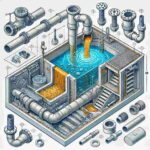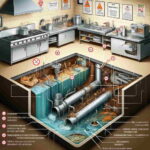Septic Tanks: Myths Vs. Facts About Septic Maintenance
If you’re a homeowner in Houston, Texas, and rely on a septic system, chances are you’ve heard all kinds of advice about septic tank maintenance. Some of it’s solid, while other bits may have you scratching your head. Septic systems may not be the most glamorous part of homeownership, but maintaining them is critical to avoid costly repairs and unpleasant backups.
In this post, we’re diving into some of the most common myths about septic tanks—and, more importantly, debunking them with solid facts. Whether you’re new to septic systems or just looking for a refresher, this guide will help you make sense of septic tank cleaning in Houston, Texas, so you can keep your system running smoothly for years to come.
Myth #1: Septic Tanks Don’t Need to Be Pumped Regularly
Fact: Septic tanks do need regular cleaning.
One of the most persistent myths out there is that septic tanks are “set it and forget it” systems. While it would be nice if your septic tank could manage itself forever, the reality is it needs regular maintenance—especially cleaning. Over time, solid waste settles at the bottom of the tank and forms sludge. If not removed, this sludge can cause blockages or even force waste back into your home. Trust me, that’s not something you want to deal with on a hot Houston summer day.
Experts recommend that you schedule septic tank cleaning in Houston, Texas, every 3-5 years, depending on the size of your tank and the number of people in your household. According to the EPA, repairs or replacements for failing septic systems can cost anywhere between $3,000 to $7,000, making regular maintenance a small price to pay for avoiding bigger problems down the road.
Myth #2: It’s Fine to Use Chemical Additives to Clean Your Septic Tank
Fact: Chemical additives can do more harm than good.
It’s easy to think that throwing a little chemical cleaner into your septic system might save you the hassle of professional septic tank waste removal in Houston, Texas. However, these additives can disrupt the natural bacterial balance in your tank that’s essential for breaking down waste. Without these bacteria doing their job, your system can fail.
In fact, studies show that the use of chemicals can lead to premature septic system failure, which costs homeowners in the U.S. over $1 billion annually. Stick with regular pumpings and avoid the temptation to use “quick fix” chemicals. Your wallet and your septic tank will thank you later.
Myth #3: Flushing Everything Down the Toilet Won’t Hurt
Fact: Only flush toilet paper and human waste.
We get it—flushing things like wipes, feminine hygiene products, or even leftover food might seem harmless. Out of sight, out of mind, right? Wrong! Septic systems are designed to handle specific materials: namely, toilet paper and human waste. Anything else—yes, even those “flushable” wipes—can cause clogs and disrupt the delicate balance in your tank.
Think of it like this: If it didn’t come from you or the toilet paper roll, it doesn’t belong in your septic tank. In Houston, where humid conditions can worsen septic problems, being careful about what you flush is even more important.
Myth #4: Septic Tanks Last Forever
Fact: With proper maintenance, your septic tank can last decades—but not forever.
Septic tanks are built to be durable, but nothing lasts forever. Most septic systems, when properly maintained, can function for 20 to 30 years. However, regular septic system cleaning in Houston, Texas, is essential to keep things running smoothly.
Local Houston regulations require septic system inspections at least every five years, reinforcing the importance of regular maintenance. Ignoring routine tasks like pumping and inspections can lead to failures that will shorten your system’s lifespan and potentially cost thousands in repairs or replacements.
Myth #5: You Can Park or Build Over Your Septic Tank
Fact: Never park or build over your septic system.
This one’s a big no-no. Your septic system isn’t just a hole in the ground; it’s a delicate structure that needs room to breathe (well, sort of). Parking a vehicle or building a structure over your septic tank or drain field can compress the soil, damaging your tank and pipes. This can lead to leaks, backups, and even complete system failure.
Instead, consider septic-friendly landscaping for areas near your system. Avoid deep-rooted plants, trees, and shrubs that can interfere with your septic system. Opt for shallow-rooted plants like grass or flowers that won’t damage the pipes. In the Houston climate, plants like Mexican Feathergrass or Texas Sage can thrive without putting your system at risk.
Myth #6: You’ll Know When Your Septic Tank Is Full
Fact: By the time you notice, it’s often too late.
Waiting for obvious signs—like slow drains, bad smells, or water pooling in your yard—is not a great strategy for septic tank maintenance. By the time these symptoms show up, your septic tank could already be full, or worse, failing.
Regular inspections and cleanings are the key to staying ahead of any problems. A trusted provider of septic tank cleaning in Houston, Texas, can help you create a maintenance schedule that keeps your system in tip-top shape. Following local guidelines and getting your system inspected every few years will help prevent a nasty surprise.

Myth #7: Septic Tanks Are Bad for the Environment
Fact: Properly maintained septic systems are environmentally friendly.
Some homeowners believe that septic systems are inherently bad for the environment, but that’s simply not true—if they’re well-maintained. When functioning correctly, septic systems use natural processes to treat wastewater. This helps to protect local water sources and ecosystems from contamination.
A study by the Texas On-Site Wastewater Treatment Research Council found that septic systems in Texas, when properly maintained, contribute to clean groundwater and prevent pollution. On the flip side, a neglected system can leak harmful bacteria and chemicals into the soil and groundwater. The environmentally responsible thing to do is stay on top of your maintenance routine.
Bonus Tip: Water Conservation and Septic Systems
Did you know that conserving water can actually help prolong the life of your septic system? Septic systems are designed to handle a certain amount of wastewater daily. Reducing water usage in your home helps reduce the strain on your septic system, allowing it to treat and process wastewater more efficiently.
Simple steps like fixing leaky faucets, using water-efficient fixtures, and spreading out laundry loads can make a big difference. In a city like Houston, where heavy rainfall can already place stress on your system, water conservation is a smart move to keep things running smoothly.
The Bottom Line: Stay On Top of Septic Tank Maintenance
There’s no doubt that septic tank maintenance can feel like one of those out-of-sight, out-of-mind tasks. But trusting in myths can quickly turn minor maintenance issues into major repairs.
By sticking to the facts—such as scheduling regular septic system cleaning in Houston, Texas, and avoiding harmful practices—you’ll save yourself headaches and keep your septic tank in great shape for years to come. If you’re in the Houston area, connecting with a local professional for septic tank waste removal in Houston, Texas, is your best bet for reliable and efficient service.
So, what’s next? Make sure your septic system gets the TLC it deserves. You don’t want to wait for something to go wrong to take action—trust me, when septic systems go wrong, they go really wrong.
Need help with your septic tank maintenance? Reach out to a trusted provider of septic tank cleaning in Houston, Texas, and get ahead of the game. Your future self will thank you.







